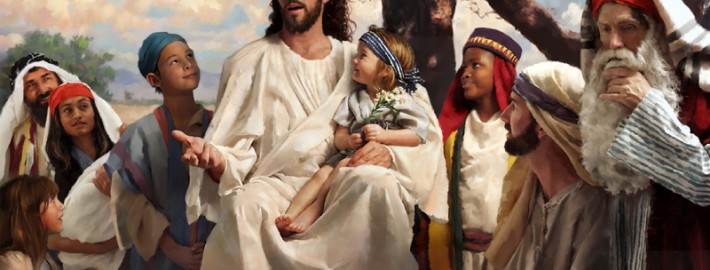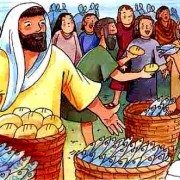Jesus of the Gospels 2: His Parables
One of the most recognizable and yet probably most misunderstood tools of Jesus Christ’s ministry was his use of parables. These were stories he told as he went from town to town, and some of them he definitely told more than once as we mentioned in the previous post on the life of a typical prophet of his day.
The fact that most of these parables had some moral underpinning seemed to have led people to simply label Jesus a “universal teacher” of timeless truths. Much as we like to find nice teaching themes from these parables for our Sunday sermons, we may be surprised that a large chunk of the parable (but not all of them) were meant not as stories of morality, but rather stories of judgment on Israel for its failure to be the light onto the world that Yawheh had called it to be, and also a means to tell Israel that he now was the means of the fulfillment of that responsibility.
Israel As a Light Onto The World
One of the callings that Israel knew and believed of itself was that God had called it to be the light onto the world. This is captured mainly by the prophet Isaiah, and was very dominant in the mindset of Jews at the time of Jesus
“Yea, He saith, ‘It is too light a thing for you to be My servant, to establish the tribes of Jacob, and to restore the scions of Israel, and I shall submit you as a light unto the nations, to be My salvation until the end of the earth’ (Isaiah, 49:6)
“I the LORD have called unto you in righteousness, and have taken hold of your hand, and submitted you as the people’s covenant, as a light unto the nations” (Isaiah, 42:6)
“And unto your light, nations shall walk, and kings unto the brightness of your rising” (Isaiah, 60:3)
This is clearly the context within which Jesus was speaking in Mt 5:14-16. Jesus Christ was not referring to the people as individuals standing before him when he spoke in the famous “Sermon on the Mount” about their light not shining for the world to see. He was talking to them as a corporate, as Israel. Our tendency to read everything with individualistic eyes (and the lack of a different word for plural “you” in English) means we’ve taken Jesus wrongly to mean Kofi as an individual is supposed to be the light of the world. But alas, the man had bigger fish to fry.
Therefore it was in Israel that salvation to the world was to be found (Jn 4:22). It was in them that the world’s hope rested. It was in them that the nations may see light. But here was a people darkened rather, having returned from exile with the prophecies of Isaiah, Daniel, Ezekiel, Zechariah etc constantly replaying in their heads about how God was going to re-establish his kingdom and judge all their enemies, yet continuously living under the yoke of the Roman empire’s hardship. Coupled with extreme economic situations, injustice and gross inequality reigned between the rich and the poor. As for the temple and its priest, there wasn’t much to be said for a priesthood which was more interested in tithing and taxing the people, than in ways of ensuring justice and mercy among God’s own people (hmm, doesn’t this sound familiar?). The fact that the high priest was appointed via politicking and bribery and not from the descendants of Aaron anymore was even more depressing. In the midst of all this were those who believed God will save Israel if the “righteous ones” bunched together and fought the enemy by the sword, and so there was a lot of tension, banditry and violence underneath the supposed calm of the day.
Enter Jesus Christ
Jesus Christ enters the fray, declaring that indeed the kingdom of God that was prophesied by the prophets has indeed arrived, but in a shape and form that was different from what they expected. He declared that it had arrived in and through him i.e. he was their Messiah, and yet he sought to expand the beneficiaries of that kingdom to include all those that society had cast away in addition e.g. those considered “sinners” like the gentiles (Mt 7:25-30) and even their Roman centurions that suppress Israel (Lk 7:1-10), the sick, tax collectors (Zacchaeus in Lk 19:1-10) , those considered poor and enslaved by poverty (Mt 18:21-35) and so on. Alongside declaring that the kingdom of God had come, he also declared that Israel had failed in its job to be the light to the world (and in whom salvation should have been found) and therefore he himself was taking up the vocation of Israel.
But he couldn’t tell this bitter truth to the Israelites straight in the face, or else his ministry would not have even lasted the 3 years that it did before he’d have gotten stoned or arrested somehow. So he had to employ parables as a means of disguising his message, so that it’s only upon further reflection would you have understood what he actually meant, by which time he’d probably moved to the next town. They were his way of planting unknown seeds in the mind of the Jewish people, until he is vindicated and those who had heard him see the wisdom and truth of it. And this is why he ended some of his sayings (not only parables) with “He who has an ear, let him hear” and why he says to his disciples
“The knowledge of the secrets of the kingdom of heaven has been given to you, but not to them … This is why I speak to them in parables: Though seeing, they do not see; though hearing, they do not hear or understand” (Mt 13:11-13)
Oh this subversive king of ours.
To Some Parables
Note that most of such “subversive” parables began with “the kingdom of God/heaven is like …” . This should tell us that he was talking about something specific, not giving nice stories of “motivational speaking” or moralistic teaching.
So let’s look at some of the parables and see what we will find.
The Parable of the Mustard Seed and the Yeast (Mt 13:31-35; Mk 4:30-32; Lk 3:18-21)
Jesus likens his kingdom to that of a mustard seed. Though it is small, it will grow and spread across the world, and all men and women will benefit from it (signified by birds perching on its branches). Again he likens it to the yeast, where only a small amount is able to work itself into the dough unnoticed, until it takes over. In the above, Christ is showing how his kingdom will slowly but surely spread through Israel and across the world, and become a light to the world that Israel had failed to achieve.
The Parable of the Lost Son (aka the Prodigal Son) (Lk 15:11-32)
This is one of the most popular parables in Christendom, typically used to show how the God loves us in that even in our sins he’s waiting to receive us into his kingdom. Well that is all nice and good, and an appropriate use of the parable. However, I suggest to you that that’s not what the Jews would have heard Jesus talking about. Since the Reformation, our eyes have been accustomed to only see the gospel to be about how God forgives us of our sins so we can go to heaven, but that’s only half the pie (and not derived from a Jewish worldview but from a Gentile one). Could it be then that in this parable, the elder son is Israel, and the younger son is the Gentiles, and that Jesus Christ is talking about how God was willing to make the Gentiles acceptable in his kingdom so that both Jews and Gentiles may benefit from the promises of Abraham as God planned? I’ll leave you to think a bit more about this one yourself.
The Parable of the Wedding Banquet (Mt 22:1-14)
Again he starts off with “the kingdom of heaven is like …” here, and tells his story of the banquet. Knowing their belief in the kingdom to come, the Jews would hear Jesus saying that God was having a party for his son (the Messiah), and had sent out invitations to “those who had been invited to the banquet” i.e. Israel and its leaders. When Israel rejects it, Jesus shows how God intends to punish them for the disobedience and wickedness to him and his servants he has sent by his statement in verse 7 (which NT scholars point to as the destruction of Jerusalem in AD 70, and which “rapture” fanatics cannot simply accept in good conscience). The banquet is then open to everyone (including all the misfits as discussed before above), and yet God again filters that as well by those who are “properly dressed”.
The Parable of the Tenants (Mt 21:33-45; Mk 12:1-12; Lk 20:9-19)
This is probably the most provocative of all parables and most plain of all Jesus Christ’s parables he spoke to the people. The books of the prophets was replete with so many symbolic pictures of Israel as a vineyard (Ps 80:8–16, Isa 5:1–7, Jer 2:21, Ezek 15:1–8, 17:5–10, 19:10–14, and Hos 10:1). It was bound to be obvious this time round that the “tenants” was a reference to the priest and Pharisees, the messengers were the prophets of Israel, the son was himself and the coming judgment of the “landowner” aka God was what happened to them “in this generation” (Mt 23:34) i.e the destruction of Jerusalem in AD 70.
More than Meets the Eye
Nicholas Thomas Wright in Jesus and the Victory of God has this to say about Jesus’s parables.
“The parables, therefore, are not simply ‘teaching’, with each parable making one and only one moral or ‘religions’ point. Such a theory is totally anachronistic … The parables were therefore essentially secretive. Jesus was not a ‘universal teacher’ of timeless truths, but the starter of a movement which was to grow like an unobserved seed turning into a plant before anyone realized.” (N.T. Wright, Jesus and the Victory of God)
And of the more overt Parable of the Tenants, this is what he says
“The parable which breaks this rule is Mt 21:33-46, but Jesus told it plainly because the time had come to abandon the earlier secrecy and force a showdown. Historically speaking, the parable belongs precisely with the action in the Temple, the moment when Jesus at last acted in a way that the authorities could not ignore.” (N.T. Wright, Jesus and the Victory of God).
Therefore the parables was the means by which Jesus Christ both declared the arrival of the kingdom of God, and in addition made known the fact that in him was salvation now to be found, and not in Israel. This meant that he was replacing the position of Israel as the giver of light and telling them that loyalty to the old symbols that held Israel together (cleanliness and food laws, the Temple and its priests, the Torah etc) were no longer the basis on which one will be considered fit to inherit the kingdom any longer. And therefore when Jesus says in John 15 that he is the true vine, he is being clear in stating that the old vine (i.e. Israel) is no longer “true”, and that in him only can the Jews (and by extension the world) find their expected salvation, not in the “old vine” of Israel.
It was all subversion, subversion, subversion. But the parables was the means by which he could say what he wanted to a hostile people, and still be able to get away with it until people REALLY stopped to think further.
Rediscovering His Parables
Again, this theme of analysis doesn’t apply to each and every parable, but does indeed apply to a large majority. But Jesus continues to amaze me as I rediscover the tools of his trade, but more importantly as I also discover my own (and I’m sure many people’s) ignorance of what these “nice” stories were all about. NT Wright himself quoted a friend thus,
“As an American friend of mine put it, most Western churchgoers treat the gospels as the optional chips and dip at the start of the evening. They are the cocktail nibbles. Only after that do we sit down at table for the red meat of Pauline theology”
Indeed our inordinate attention to Paul’s letters (which were written to explain some angles of the gospel, but not to state the gospel message itself) has blinded us to a lot. Mathew, Mark, Luke and John is where the real meat is. Let’s not drown the monumental impact of Jesus’s life, message and his kingdom with our haste to preach a Jesus that is acceptable to everyone (and that can be used to support every “personal” individualistic worldview agenda).
The man had bigger fish to fry, and his parables were his fishing line to catch the fish “who had ears to hear”, who will follow him into the deepest of waters without fear in launching his kingdom, which had come, and yet was not yet fully revealed.









Trackbacks & Pingbacks
[…] had failed its commission to be the light of the world (something I mentioned in my previous post here). Therefore not only was the kingdom of God arriving in him, but the Jewish nation were under […]
[…] had failed its commission to be the light of the world (something I mentioned in my previous post here). Therefore not only was the kingdom of God arriving in him, but the Jewish nation were under […]
Leave a Reply
Want to join the discussion?Feel free to contribute!